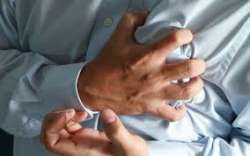ATTENTION! Heart attack kills one person every 33 seconds in India
New Delhi: One person dies every 33 seconds owing to an heart attack in India, says a top city cardiologist, adding that the deadly condition is making Indians its victim 10 years ahead of the

New Delhi: One person dies every 33 seconds owing to an heart attack in India, says a top city cardiologist, adding that the deadly condition is making Indians its victim 10 years ahead of the people in the West.
"India is currently witnessing nearly two million heart attacks a year and majority of the victims are youngsters," said Dr Ashwani Mehta, senior consultant cardiologist at Sir Ganga Ram Hospital here.
He was delivering a public lecture on "Living with Heart Disease: All about Stents and Interventions" at the India International Centre (ICC) in the heart of the capital on Tuesday.
"Men living in cities are three times more prone to heart attacks than people living in villages. As for women, the risk rises significantly after menopause," Mehta told the gathering.
Low-density lipoprotein cholesterol (LDL-C) or "bad" cholesterol is the leading factor for heart attacks.
Diabetes, smoking, high blood pressure, genetic history, lifestyles, especially the higher intake of carbohydrate rich foods and lack of regular physical exercise are other factors that lead to heart attack.
Patients often tend to neglect chest pain citing acidity or gastric trouble which, Mehta said, should not be overlooked.
"Any discomfort or any exertions that a person experiences after walking, particularly if it persists after taking rest, could be linked to heart and should not be ignored but should be immediately taken care," Mehta noted.
Citing a latest World Health Organization (WHO) report that said India has the highest rate of cardiac arrests in the world, Mehta said that with timely interventions, heart diseases are preventable.
"Healthy eating with consumption of fresh fruits and vegetables, coupled with daily exercise and a stress-free environment also can ward off heart attack risks," Mehta suggested.
Lifestyle changes like stress reduction, regular check-ups (including lipid profile) and adherence to medications are very important, Mehta stated.